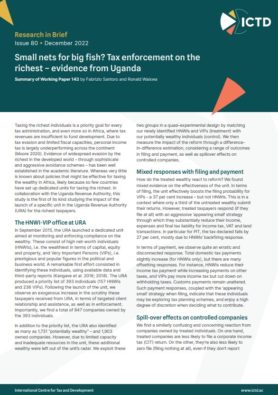Research in Brief 80
Taxing the richest individuals is a priority goal for every tax administration, and even more so in Africa, where tax revenues are insufficient to fund development. Due to tax evasion and limited fiscal capacities, personal income tax is largely underperforming across the continent (Moore 2020). Evidence of widespread evasion by the richest in the developed world – through sophisticate and aggressive avoidance schemes – has been well established in the academic literature. Whereas very little is known about policies that might be effective for taxing the wealthy in Africa, likely because so few countries have set up dedicated units for taxing the richest. In collaboration with the Uganda Revenue Authority, this study is the first of its kind studying the impact of the launch of a specific unit in the Uganda Revenue Authority (URA) for the richest taxpayers. This Research in Brief is a summary of ICTD Working Paper 143 by Fabrizio Santoro and Ronald Waiswa.
